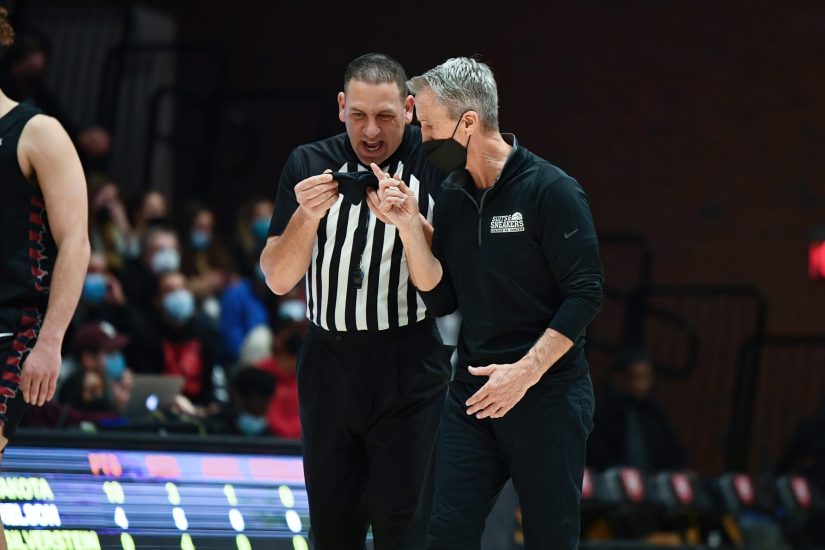
Penn learned the hard way just how far Cornell and coach Brian Earl have come on Friday night, dropping an 88-69 decision to the Big Red in Ithaca, N.Y.
The Quakers were disrupted by Cornell’s uptempo offense and ultra-aggressive defense from the opening tip, even though they matched the Big Red for roughly 30 minutes.
The game flipped when Cornell delivered an emphatic counterpunch to a shot which Penn fans likely thought could have carried the team to victory. Junior guard Clark Slajchert hit a tough three from the left wing through contact to give the Quakers a 56-55 lead with 11:51 to play — and arguably should have had an opportunity for a four-point play.
No matter. On the very next possession, the Big Red’s Greg Dolan drove through the lane, hit a layup and drew a foul on Penn forward Max Martz in the process. The foul, Martz’s fourth, forced Penn coach Steve Donahue to pull the man who had been his most efficient player thus far from the game.
By the time Martz returned to the floor, it was too late. Cornell used the and-one to ignite a game-deciding 17-4 run.
As Quakers fans reflect on Friday’s contest, they’ll find themselves haunted by some ghosts from the team’s past, which are detailed below:
1. Pressure defense remains the biggest threat to Penn’s offense.
When the Quakers got into their halfcourt offense and slowed the tempo down on Friday, they looked as good at generating open looks inside as they have all season. Penn shot 13-for-18 on two-pointers in the first half.
But when the Red and Blue were met with pressure in the backcourt or far from the basket on Cornell’s end of the floor, they made repeated uncharacteristic mistakes, such as when senior swingman Lucas Monroe air-mailed a long outlet pass in the first half which would have led to an easy layup for senior center Max Lorca-Lloyd.
Cornell’s pressure seemed to especially disrupt Slajchert, who wound up committing six turnovers. Much like he did in Penn’s season-opening blowout loss to Iona, Slajchert got caught traveling a handful of times.
The most frustrating moment for Slajchert came at the tail end of Cornell’s backbreaking run, when he got called for a walk in Penn’s backcourt while trying to escape a double-team.
Penn committed 20 total turnovers on Friday. The performance was reminiscent of the Quakers’ 19-giveaway loss to Missouri back in November.
2. There may not be a perfect option for the five spot in Penn’s lineup.
Sophomore forward Nick Spinoso’s passing ability — and turnover issues — have both been well-detailed here.
Perhaps that latter point is why he sat for the bulk of the second half on Friday and played just 12 minutes.
With Spinoso riding the bench for long stretches, Donahue leaned on senior Michael Moshkovitz, who played just two minutes against Brown on Monday.
That experiment ended in disaster. The Quakers scored just 28 points per 100 possessions with Moshkovitz on the floor, per KenPom. Moshkovitz displayed some deft passing skills and post moves last season, but he missed both shots he took Friday — including a wide-open corner three — and committed two turnovers to just one assist.
Lorca-Lloyd got five minutes of action, primarily because the Quakers would use him to temporarily shift into a zone defense. Lorca-Lloyd is a good shot blocker, but his ceiling in Penn’s offense may be limited since he cannot fill the point forward role Spinoso and Moshkovitz play when they are on the floor.
Spinoso has the highest ceiling of the three players, which makes it all the more confusing why he wasn’t very involved Friday.
3. Guard depth could be an issue down the line.
If there is one silver lining to the fact that Friday’s game got out of hand, it’s that Donahue was able to give Slajchert and star junior Jordan Dingle a little bit of extra rest.
Both Slajchert and Dingle wound up playing 30 minutes; they’ll be leaned-on big time Saturday in a game against Columbia that is pretty close to a must-win.
Slajchert and Dingle combine to form the highest-scoring backcourt in the country. But behind them, the cupboard gets pretty bare.
Sophomore George Smith, who missed roughly a month after he broke his nose against Lafayette just before Thanksgiving, is struggling big-time on the offensive end of the floor. The steady perimeter defender finished 1-for-6 from the field in 19 minutes; the Quakers scored just 42 points per 100 possessions with Smith on the floor on Friday, per KenPom.
Freshman Cam Thrower, whose role has fluctuated this season, got just two minutes of garbage time action.
Penn will need one of those players to step up as Ivy play rolls on.
Although I empathize with the sentiment that tonight’s game versus Columbia is a “must-win,” I’m not sure any game this early in the conference schedule can truly qualify as a must-win, especially with Yale having dropped its first two games. Realistically, there are 5 teams playing for 4 spots in Ivy Madness and Penn can do no worse than be tied for 4th even if it somehow drops the game tonight against the Lions. Moreover, having watched Columbia struggle against Princeton last night, I can’t imagine Penn losing tonight unless the Lions turn a complete 180. I suppose Columbia could make 16 threes like the lowly Cal Bears did on their home court last night in an unlikely rout of Stanford. But I’m pretty sure the Quakers will not allow that to happen.